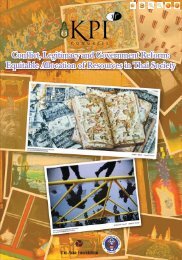SUFFiciENcy EcONOMy ANd GRASSROOtS DEvElOPMENt
SUFFiciENcy EcONOMy ANd GRASSROOtS DEvElOPMENt
SUFFiciENcy EcONOMy ANd GRASSROOtS DEvElOPMENt
Create successful ePaper yourself
Turn your PDF publications into a flip-book with our unique Google optimized e-Paper software.
238<br />
The Meaning of Sufficiency Economy <br />
International Conference<br />
Japan, but so far this interest has been met with restraint. The Thai market itself is<br />
large enough for the Asoke products, and exports would also involve problems with<br />
expiry, preservatives, packing, customs, and trading partners in foreign countries.<br />
<br />
BUNNIYOM ASOKE BUDDHIST ECONOMICS<br />
Asoke centres do not purposely boycott foreign goods; neither do they<br />
participate in any “buy local” -campaigns in Thailand after 1997. Asoke people<br />
practise “spiritual boycott” against foreign brand names due to their emphasis on<br />
Buddhist frugality. Their avoidance of foreign goods springs from their general<br />
negative attitude to luxury goods and any kind of luxurious life. Foreign soft drinks<br />
are not favoured. Instead, Asoke people drink locally made fruit drinks such as<br />
passion fruit, guava, tamarind and other fruit juices. They usually produce their own<br />
soymilk. <br />
Modesty (maknoy sandot) is one of the key-concepts of the Asoke and all<br />
imported or even locally made candies and sweets are generally avoided. The Asoke<br />
monks and nuns are allowed to eat only one meal a day. When a person eats only<br />
one meal a day, it would be rather unwise to fill one’s stomach with food that has no<br />
nutritious benefits. Many Asoke lay people try to reduce the number of daily meals<br />
“from uncountable meals to countable meals” 11 , in fact, very few serious Asoke<br />
practitioners eat more than twice a day. <br />
All Asoke members refrain from smoking and drinking, which again reduces<br />
their consumption of any foreign imported goods.<br />
At the same time, Asoke people are rather flexible. It is by no means forbidden<br />
to use toothpaste or toothbrushes of foreign brand names. Same applies to higher<br />
technology – cars, computers, cameras, TVs and other electric appliances are usually<br />
of foreign origin.<br />
The early Asoke centers were usually without electricity, which was quite a<br />
shock to the visiting city-dwellers, and partly is behind the image, that the Asoke<br />
group is strict and conservative to the extreme. 12 Nowadays, however, all Asoke<br />
centres do have electricity. Usually they also have a TV in the meeting hall (sala),<br />
where the members gather in the evening to watch TV or videos for a couple of<br />
hours a day. <br />
Most of the centres also have computer rooms, often air-conditioned. Many<br />
private houses have electric fans, refrigerators and maybe even private TVs,<br />
particularly in the condominiums in the urban centre, in Santi Asoke. In the rural<br />
centres, the houses are built in traditional Thai style with open balconies and do not<br />
11<br />
Interview in Sisa Asoke with Khun Kaen Fa in October 2006.<br />
12<br />
Grant Olson presents some of the first observations on the Asoke group in his MA thesis<br />
“Sangha Reform in Thailand. Limitations, Liberation and the Middle Path” (Olson 1983:66-73).














